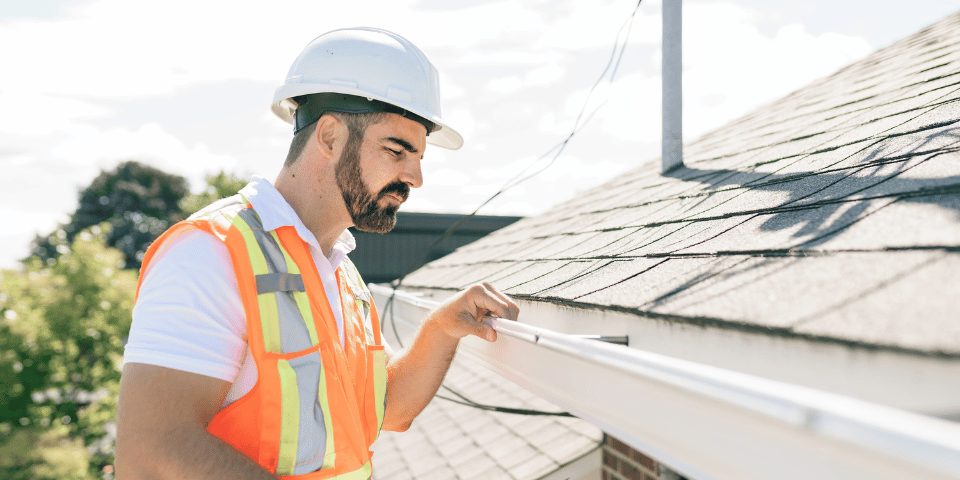Acing the Home Inspection Process
September 04, 2024

A thorough home inspection will ensure your dream house doesn't become a nightmare of hidden repairs and unexpected costs.
Acing the Home Inspection Process
Buying a home is a major life decision you should be proud of and excited about. It is also likely one of the most significant financial investments you'll ever make. At Education First Federal Credit Union, we understand the importance of this process, which is why we've created this guide to help you navigate the home inspection journey step-by-step.
Understanding the Purpose of a Home Inspection
If you have begun researching or touring homes, you may already know that a home inspection is an essential part of the purchasing process and may even be required by your lender (credit union, bank or mortgage broker). But that doesn't explain why a home inspection is important and why you should require it on any home you purchase.
In its most basic definition, a home inspection acts as an insurance plan during the home-buying process, protecting you from purchasing a home that may need costly repairs you didn't foresee.
A home inspection thoroughly evaluates the property's overall condition and is typically administered by a certified inspector. The home inspector will perform routine inspections of the following areas:
- Exterior: This includes the roof, siding, foundation, windows, doors, and landscaping.
- Interior: The inspector will assess the condition of walls, ceilings, floors, stairs, and other internal structures.
- Plumbing: Pipes will be inspected for leaks, water pressure, drainage, and functionality.
- Electrical: The inspector will check outlets, switches, circuits, and the electrical panel for any issues.
- HVAC (Heating, Ventilation, and Air Conditioning): The heating and cooling systems will be evaluated for efficiency and safety.
- Appliances: Any included appliances, such as the stove, refrigerator, dishwasher, and washer/dryer, will be examined and tested.
- Attic and Basement/Crawlspace: These areas will be inspected for insulation, ventilation, moisture, and signs of pests or mold.
Note that properties with unique features like swimming pools, hot tubs or saunas are generally not included in a traditional home inspection as they require specialized knowledge of those structures. Some professionals provide this service - though they may not go by the term inspector - and it is wise to always get the opinion of one of these experts before purchasing a home with these perks.
The findings are carefully recorded and paired with recommended corrective actions; this comprises the home inspection report. All home inspectors furnish a written report, and most will also include photo or video documentation for further clarification.
The process often makes prospective buyers nervous as they may feel that the inspector is looking for something to discourage them from buying the home, but that couldn't be further from the truth. The report empowers a buyer to make well-informed decisions about the investment, sometimes resulting in negotiations about the purchase price, pre-purchase repairs, or withdrawing from the transaction entirely.
While home inspections are not required by Texas law, they are often a prerequisite for a mortgage loan as they assure the lender that the property is in good condition and has no significant repairs that might jeopardize the borrower’s ability to repay the loan. In the rare instance that a lender does not require a home inspection, we recommend that one always be performed as a prophylactic measure before closing on the sale of a house.
Hiring a Qualified Home Inspector
The value of a home inspection depends on the competence and expertise of the inspector who performs the service.
Look for licensed, experienced, certified inspectors by reputable organizations such as the American Society of Home Inspectors (ASHI) or the International Association of Certified Home Inspectors (InterNACHI). Ask for referrals from trusted sources, read online reviews, and don't hesitate to interview multiple inspectors before deciding.
Your real estate agent may also have recommendations for a home inspector, but we recommend that home buyers do their own research and avoid this path. Even though your agent may be genuinely well-meaning and have a lot of contacts, there is potential for conflict of interest in that the agent gets paid a commission on the sale of the home, so a home inspection agent who receives a lot of referrals from an agent may feel pressured to “go easy” on the inspection.
According to the Texas Real Estate Commission (TREC), there are three distinct levels of licensed home inspectors:
- Apprentice Inspector - An Apprentice Home Inspector is an entry-level inspector. They are required to train under a Professional Real Estate Inspector's direct supervision and pass an exam before advancing.
- Real Estate Inspector - A Real Estate Home Inspector has an intermediate-level license, meaning they have met specific experience and educational requirements while working as an Apprentice Inspector and have passed an exam.
- Professional Real Estate Inspector -A Professional Real Estate Inspector is the highest-level license available in the state of Texas. To become one, the inspector must first have worked as an Apprentice and Real Estate Inspector and passed both exams.
The inspector's level of expertise, along with the size and location of the property, both affect the cost of the inspection. As a prospective homeowner, budgeting between $300 and $1,000 for a thorough home inspection is wise planning.
Scheduling the Inspection
Once you've selected a qualified inspector, the next step is to schedule the inspection. If you're purchasing an existing home, coordinate with your real estate agent and the seller's agent to find a mutually convenient time.
Depending on the size of the house and accessibility to the systems, a home inspection can last anywhere from a couple of hours to an entire day, so be sure to set aside enough time in your schedule if you plan to attend (and we suggest you do; read on for more on that point).
Attending the Inspection
While buyers don't need to be present during the home inspection, we strongly encourage it. Being onsite allows you to actively participate in the process, ask questions, and gain firsthand insights into the property's condition. If you can't attend the inspection, you can have your real estate agent, friend and/or family member participate in your place.
So, while it is standard practice - and perfectly acceptable for the buyer to attend the inspection (the buyer is paying for the service), it is not standard practice for the seller or their real estate agent to attend. They can open the home, if necessary, but should not hang around as it allows them to dispute the inspector's findings before the final report is prepared.
Reviewing the Inspection Report
Once the inspection is complete, the inspector typically provides the buyer with a detailed report within 24-48 hours. Be sure to review the report carefully, paying close attention to any areas of noted concern or recommendations for further evaluation or repair. Don't hesitate to seek clarification from the inspector if you have any questions or need additional information.
When reviewing a home inspection report, it is important to pay attention to several key factors. In existing homes, focus on the condition of the foundation, roof, plumbing, electrical systems, HVAC system, insulation, and presence of any pests. For new construction homes, prioritize the quality of workmanship, materials used, adherence to local building codes, structural integrity, and functionality of all systems and appliances. In both cases, look for any signs of water damage, mold, or potential safety or health hazards.
Negotiating Repairs, Credits or Purchase Price
According to Credible, homebuyers save an average of $14,000 on the final sale price of their home when negotiating with the seller after a home inspection.
What findings are worth negotiating, and which aren't worth the hassle? We recommend that you negotiate on big-ticket items like structural defects and other high-dollar items, such as:
- Structural - This may be an old or leaky roof or problems with the home's foundation. Structural issues are usually the most expensive to repair, so put these at the top of your negotiating list.
- HVAC -Another costly repair is updating the HVAC system. Old units, poor ductwork and unmaintained equipment are signs that you may have to replace or pay for costly repairs before you had planned to.
- Electrical - Out-of-date or faulty wiring can be a fire hazard.
- Windows—Single-pane or wood-frame windows can significantly increase a home's heating and cooling costs. Replacing them with double-pane or vinyl-framed windows can reduce energy usage (e.g., cost) by up to 24%.
- Plumbing - Faulty plumbing can lead to a leak in the wall or under the flooring, and if left unrepaired, it may prevent your homeowner's policy from covering any damage that may result later down the road. A leak can also lead to the growth of mold, which isn't easy to detect behind sheetrock or under flooring until it is too late.
If you're wondering how to negotiate with the seller on these or other items, your real estate agent can help you. An experienced agent can identify those items that a seller is more likely to pay for the repairs or negotiate on the selling price. Items that aren't worth bickering over are appliances and cosmetic items, like old flooring that isn't damaged by water discharge).
A home inspection is something that every prospective homebuyer should pursue as part of the homebuying process. The cost of one performed by an experienced and licensed inspector is well worth its weight in gold. The ability to identify potential pitfalls and costly repairs before you purchase a home is invaluable. It will ensure that your new home is something you feel excited about and not anxious about.
Want to learn more about the home-buying process? Check out these helpful blog posts and tools:
- 9 First-Time Homebuyer Mistakes
- Closing Costs Explained
- Your Complete Guide to Construction Loans
- Buying a Home In a Changing Market
- Mortgage Calculators
Whether you are buying a starter home, looking for something bigger to accommodate your growing family or building new construction, the Education First Mortgage team is here to help. Make an appointment today to talk to us. We're ready to help your dreams come true!




.png?width=352&name=Buying%20a%20Home%20in%20a%20Changing%20Market%20(960%20%C3%97%20480%20px).png)
.png?width=352&name=FirstTime%20Homebuyer%20Mistakes_%20960_480%20(8).png)